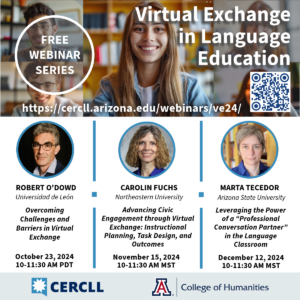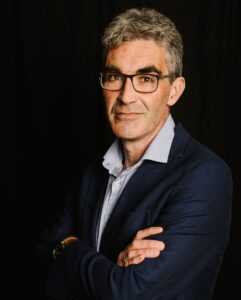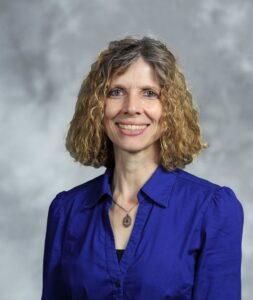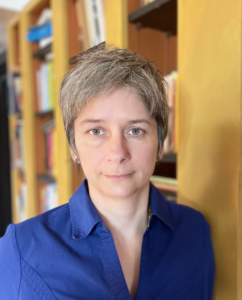Join us in our Fall series of free professional learning webinars for language educators!
Often, opportunities to connect with peers abroad are limited to students who have the time and financial means to travel and stay for extended periods of time. Open Doors reports that less than 10% of U.S. undergraduates study abroad. As a low-cost or no-cost opportunity, virtual exchange has the potential to enable all students to connect and collaborate with peers from different cultural and linguistic backgrounds on projects that model the encounters they will have in the workforce. In the process, they can develop critical skills such as collaboration, communication, proficiency in another language, understanding of different perspectives, awareness of our common humanity, and civic and global engagement.
than 10% of U.S. undergraduates study abroad. As a low-cost or no-cost opportunity, virtual exchange has the potential to enable all students to connect and collaborate with peers from different cultural and linguistic backgrounds on projects that model the encounters they will have in the workforce. In the process, they can develop critical skills such as collaboration, communication, proficiency in another language, understanding of different perspectives, awareness of our common humanity, and civic and global engagement.
For these benefits to become a reality, however, careful instructional planning is essential, and this is what the presenters in this series will focus on, each coming at it from a different angle.
The webinars are free to attend, but participants must register in advance. Participants who attend these events live can request a certificate of attendance for 1.5 hours of continuing education for each webinar they attend. In addition, live attendees will be contacted after each webinar with information about how to apply for a digital badge.
Register for any combination of these webinars!
Overcoming Challenges and Barriers in Virtual Exchange
Webinar presented by Robert O’Dowd (Universidad de León, Spain)

Wednesday, October 23, 2024, 10-11:30 AM Arizona (UTC -7)
To see when it begins where you are, visit: https://tinyurl.com/3me33ehh
Abstract:
Forms of online collaborative learning, such as Virtual Exchange and Blended Mobility, are becoming increasingly popular in foreign language education. Virtual Exchange (VE) refers to the numerous online learning initiatives and methodologies which engage learners in online collaborative learning and interaction with partners from different cultural backgrounds as part of their study programmes. Blended Mobility combines stages of online collaboration with short periods of physical mobility.
Although VE has been employed in foreign language education for over 25 years, it has received much greater attention since the recent COVID-19 pandemic and many practitioners are exploring its potential to develop foreign languages learning, intercultural competence and global citizenship in their classrooms (Porto, 2018; Ramirez, 2019; Trapé, 2018).
In this presentation I will use key publications from the literature to explore how VE and Blended Mobility can promote foreign language learning as well as global citizenship. I will also outline how VE and Blended Mobility can be integrated effectively into foreign language programmes. Finally, I will reflect on the challenges educators face as we try to use this activity to deal with issues of diversity and inclusion and to establish equitable relationships with partners from other countries.
➣Click here to view the recording and other resources.
Advancing Civic Engagement through Virtual Exchange: Instructional Planning, Task Design, and Outcomes
Webinar presented by Carolin Fuchs (Northeastern University).

Friday, November 15, 2024, 10-11:30 AM Arizona (UTC -7)
(Visit this URL to see what time that is where you are: https://tinyurl.com/mr2bvhec)
Abstract:
Virtual exchange, a pedagogical approach that uses technology to connect learners from diverse geographical and cultural backgrounds to promote language and cultural learning (O’Dowd, 2018; see also Belz, 2003; Warschauer, 1996), has become increasingly popular in language education settings. Recently, virtual exchange has broadened its focus from intercultural models to a more comprehensive framework that includes civic engagement and integrates language learning with community involvement (e.g., Porto, 2021). Recent research underscores the potential of virtual exchange to improve linguistic and intercultural skills while promoting civic engagement. This is achieved through student participation in social initiatives that connect languages and communities (Palpacuer Lee et al., 2018). This approach is particularly significant for historically underserved groups, such as older adults.
In this webinar, I will discuss the potential of implementing virtual exchange to facilitate civic engagement for outreach purposes across a foreign language program curriculum. Specifically, I will focus on instructional planning for stakeholders, presenting task models, examples, and outcomes by referencing various projects. Drawing on results from different student cohorts, I will illustrate how advancing civic engagement can prepare students for navigating and contributing to a globalized world, while promoting empathy and understanding across generations. Participants are invited to share and explore how adapting a virtual exchange approach can be applied to their educational contexts.
➣Click here for presenter resources; recording now available.
Virtual Exchanges: Leveraging the Power of a “Professional Conversation Partner” in the Language Classroom
Webinar presented by Marta Tecedor (Arizona State University).
Thursday, December 12, 2024,10-11:30 AM Arizona (UTC-7)
To see when it begins where you are, visit: https://tinyurl.com/ancenvub
Abstract:
In the last few years, and particularly since the onset of the COVID 19 health crisis, Virtual Exchanges (VE) have grown in popularity among world language educators for their capacity for facilitating real-time, authentic, multimodal communication between learners and speakers of the target language and for their potential to increase learners’ contact hours with the target language outside the classroom.
Pedagogical initiatives that use VEs to promote interpersonal communication have traditionally been carried out in the context of e-tandems—virtual exchanges in which two learners with different native languages help each other learn their respective languages—and telecollaboration projects—virtual communications in formal educational settings between two or more students learning their interlocutor’s first language. Currently, a third model has started gaining popularity in formal educational settings: service-provider virtual exchanges (SPVE): one-on-one or small-group VE sessions between L2 learner(s) and a native speaker who receives economical compensation for their conversational services.
In this presentation, Dr. Tecedor will focus on the defining characteristics of SPVEs and discuss how this more recent model can be incorporated in the world language curriculum.

